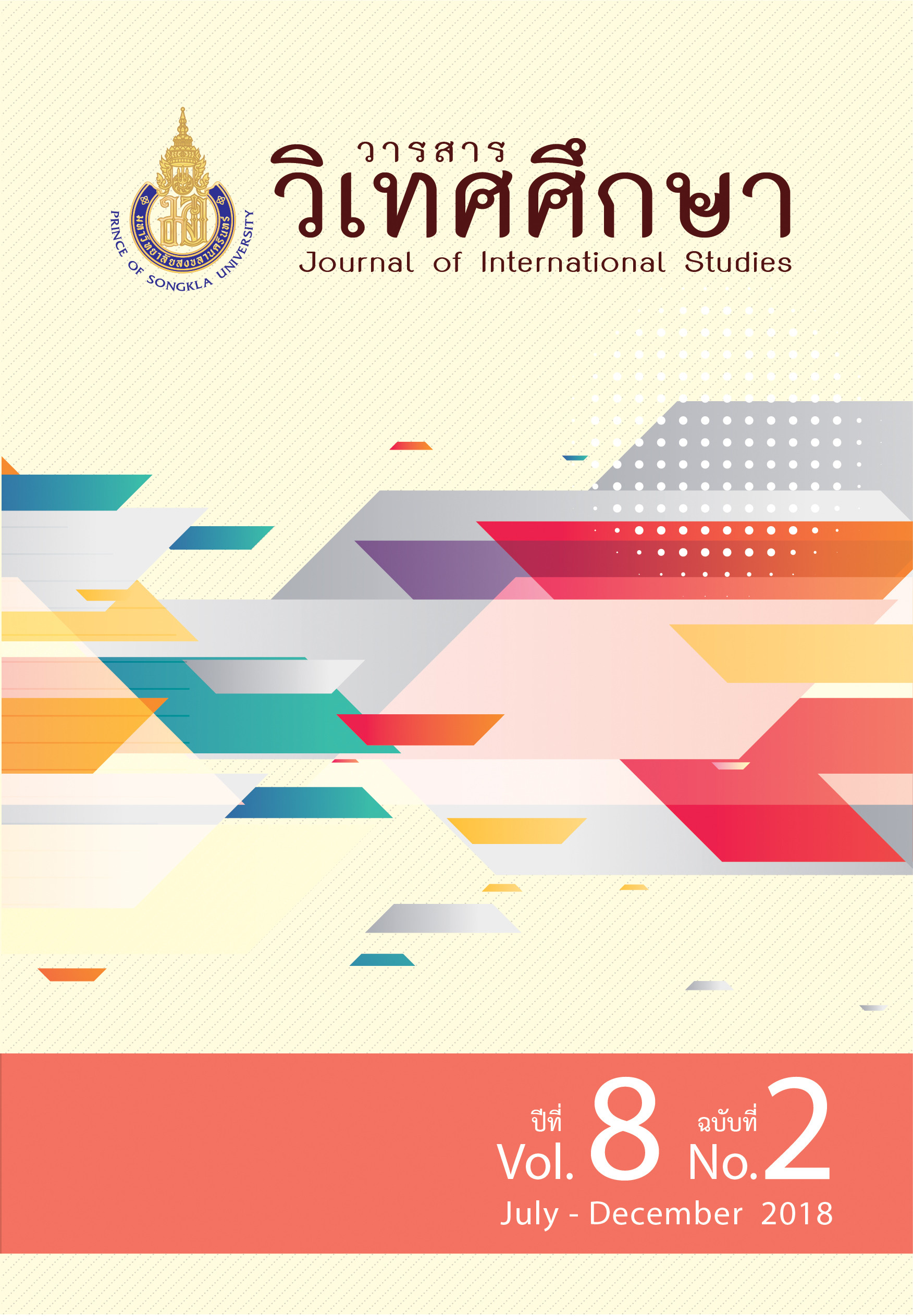Korean Vocabulary Learning Strategies of Students at Prince of Songkla University, Pattani Campus: A Case Study of Korean 1 in the First Semester 2016
Main Article Content
Abstract
The purpose of this research is to use its study results as a pathway towards improvement in Korean language teaching, from appropriate methods to conforming to standards of Korean vocabulary learning. Test subjects consisted of students from Prince of Songkla University - Pattani Campus who selected the Korean 1 (416-101) course for the first semester of the 2016 academic year. The author collected data through questionnaires on the subjects’ vocabulary learning strategies and by testing their Korean reading skills.
The study found that the students with high Korean reading skills naturally memorized vocabu- laries as they used them and as such, consistently learned new vocabulary; they incorporated various learning strategies. Those with medium or weak
marks usually memorized vocabularies through repetition; they did not use various strategies. The instructor took a principal role in encouraging students’ enhancement of vocabulary learning skills. Through observation and paying attention to their use of various learning strategies, the instruc- tor assists students in their understanding and approaches to their vocabulary learning.
Article Details
Statements and opinions expressed in articles herein are those of the authors and do not necessarily reflect the position of the editors or publisher.
Article, information, text, image, etc. which are published in Journal of International Studies, belong to Journal of International Studies. If anybody or any organization would like to use part or whole of them, they must receive written permission from Journal of International Studies before usage.
References
ตติยา เมฆประยูร. (2544). การเปรียบเทียบการใช้กลวิธีการเรียนรู้คำศัพท์ภาษาอังกฤษของนักเรียนชั้นมัธยมศึกษาปีที่ 5 ที่มีความสามารถในการอ่านแตกต่างกันในโรงเรียนสาธิตสังกัดทบวงมหาวิทยาลัยในกรุงเทพมหานคร.วิทยานิพนธ์ศิลปศาสตรมหาบัณฑิต มหาวิทยาลัยศรีนครินทรวิโรฒ, ประสานมิตร.
นัฐยา บุญกองแสน. (2556). การใช้กลวิธีการเรียนรู้คำศัพท์ภาษาอังกฤษของนักศึกษาไทยในระดับอุดมศึกษา. วิทยานิพนธ์ศิลปศาสตรดุษฎีบัณฑิตมหาวิทยาลัยเทคโนโลยีสุรนารี.
ศิรพร ลิมตระการ. (2534). ความรู้เบื้องต้นเกี่ยวกับการอ่าน.เอกสารการสอนชุดวิชาการอ่านภาษาไทย หน่วยที่ 1-7. นนทบุรี: มหาวิทยาลัยสุโขทัยธรรมาธิราช.
สาคร พุทธผล. (2546). คำศัพท์สอนอย่างไรให้ได้ผล. วารสารวิชาการ, 6(9), 56- 64.
สุภาภรณ์ แท่งทอง. (2532). การตรวจสอบความซ้ำซ้อนของคำในหนังสือภาษาอังกฤษสำหรับวิชาภาษาอังกฤษอ011 และหนังสือภาษาอังกฤษระดับประถมศึกษา. วิทยานิพนธ์ปริญญาศิลปศาสตรมหาบัณฑิตคณะศึกษาศาสตร์มหาวิทยาลัยเกษตรศาสตร์.
สุมล จักรแก้ว. (2536). การศึกษาความสัมพันธ์ระหว่างวิธีการสอนคำศัพท์ของครูกับกลยุทธ์การจำคำศัพท์ของนักเรียน. วิทยานิพนธ์ศึกษาศาสตรมหาบัณฑิตมหาวิทยาลัยศรีนครินทรวิโรฒ, ประสานมิตร.
แอรอน โค ทองเชียง. (2551). กลวิธีการเรียนรู้คำศัพท์ในการอ่านภาษาอังกฤษในบริบทตามธรรมชาติของนักศึกษามหาวิทยาลัยเชียงใหม่. วิทยานิพนธ์ศึกษาศาสตร์มหาบัณฑิตมหาวิทยาลัยเชียงใหม่.
Medani-Osman-Ahmed. (1993). Vocabulary Learning Strategies Dissertation Abstracts Internation. 50(01), 208.
Oxford, R. L. (1990). Language learning strategies: what every teacher should know. New York: Newbury House.
고려대학교 한국어문화교육센터. (2014). 재미있는 한국어 1.서울: 교보문고.


